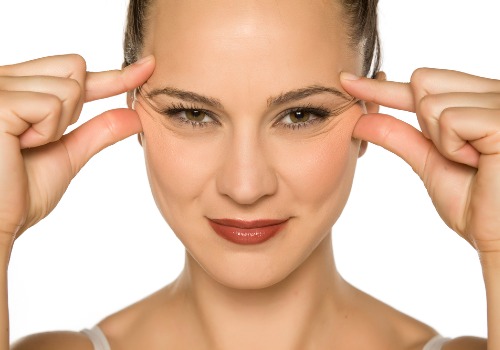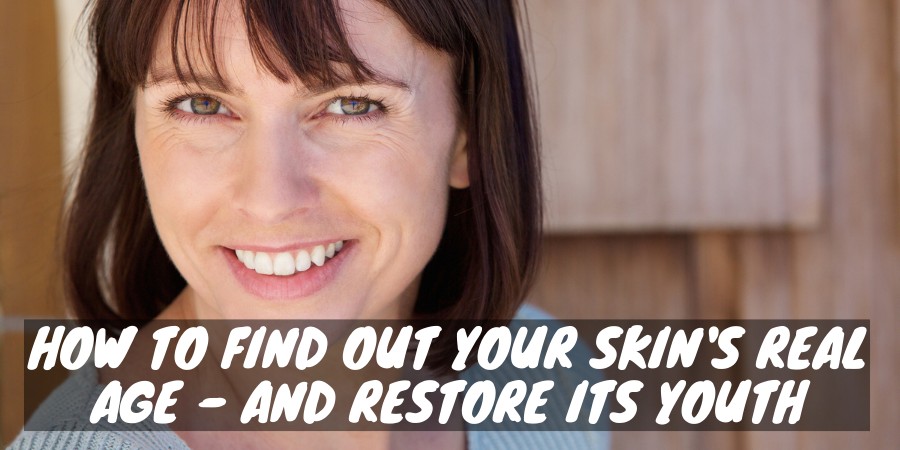You know how old you are, and you have a pretty good idea of how old you look.
But do you know the functional age of your skin?
Is it firm, strong and smooth like a 20-something’s? Or does it stretch, sag and tear like a 70-year-old’s?
With this easy skin age test, you can learn your skin’s functional age and take the appropriate steps to keep it young for as long as possible.
The Skin Age Test: Learn Your Skin’s Real Age
Performing the Test
The skin age test couldn’t be easier to perform.
Simply pinch the skin on the back of your hand between your thumb and forefinger, then hold it for five seconds.
When you release it, count the seconds that elapse until the skin has fully settled back into place. This is your skin age score — read on to find out what it means.
What Do My Results Mean?

The number of seconds that passes between the time you release your skin and the time it flattens back out can be used to find out your skin’s functional age.
If it took less than two seconds to return to its place, your skin age is under 30. Your skin is elastic and supple, retaining its shape and fullness.
If your skin snapped back in 3-4 seconds, your skin age is 30-44. It’s just beginning to lose elasticity and become stretched out when pulled.
A 5-9 second return time places your skin age between 45 and 50. This is the age at which most people begin to notice wrinkles and sagging.
Skin that takes 10-15 seconds to flatten out has a functional age of around 60. Collagen loss is obvious and the skin is likely much thinner than it was just a few years ago.
And if your skin takes longer than 15 seconds to return to its original position, your skin age is 70 or higher. It’s lost most of its collagen and can barely support itself, let alone withstand stress.
What’s Causing My Skin to Age?

If the skin age test revealed that your skin is younger than or equal to your actual age, you’re probably thrilled.
But if it showed that your skin behaves older than it is, you’re probably wondering why that is — and if there’s anything you can do about it.
These six factors all contribute hugely to skin age. Improving them will help you stave off future signs of aging and even reverse existing ones.
Sun and UV Exposure
Perhaps the most notorious contributor to aging skin, the sun is a tough foe to contend with.
After all, unless you live at the poles, there’s no escaping it for much of the year. Its powerful rays can penetrate through clouds and glass, so your skin absorbs them even when you’re not basking in sunlight.
The sun’s damage is multifaceted. UV rays damage the DNA in your skin cells, impairing your ability to produce healthy new ones and increasing your risk of developing cancer.
Mutated cells can’t produce enough quality collagen and elastin to allow your skin to maintain its texture and shape. This leads to wrinkling, sagging, roughness, discoloration, and thinning — in other words, aging.
The sun also dehydrates your skin, and thirsty skin is even worse at healing itself, producing new cells and remaining youthful.
That’s why sun protection is so important if you want to prevent aging. Wear a broad-spectrum sunscreen with a minimum SPF of 30 every single day, and reapply it every two hours for continuous coverage.
Poor Diet and Bad Habits

The phrase “you are what you eat” isn’t just a cliche — it’s the truth. A low-quality diet leads to low-quality skin.
Greasy foods with low nutritional values don’t provide your skin with the vitamins and minerals it needs. All they provide it with is oil, salt and sugar, leading to clogged pores, reduced cell functioning and old, tired-looking skin.
But if you switch to fresh produce, whole grains and lean proteins, your skin cells will become energized and start working overtime to reduce the signs of aging.
Nutrients to prioritize for skin health include iron, zinc, selenium, vitamin A, vitamin C, vitamin E and vitamin K. All of these play essential roles in skin cell functioning, collagen production and overall youthfulness.
And a good diet goes hand-in-hand with good habits. Smoking, drinking alcohol and using drugs are all terrible for your skin, and you’ll see a big difference if you give them up.
Lack of Hydration
Dehydrated skin cells are unhappy skin cells.
Unfortunately, as you get older, your skin’s ability to retain moisture decreases. This stresses your skin out, weakening it and accelerating aging.
Without proper hydration, your skin can’t produce the collagen it needs to thrive. Thankfully, there are many ways to remedy this.
The most obvious: drink more water! The average adult needs at least eight glasses of water a day to keep their whole body (including the skin) hydrated.
If that sounds like too much water to drink, you can also supplement your hydration by eating more water-rich foods. Fresh fruits and vegetables, milk, cottage cheese and soup all have high water contents, providing a delicious way to hydrate.
Finally, you can ensure that your skin is always hydrated by using skincare products that contain humectants (hydrators) and emollients (moisturizers).
Humectants like hyaluronic acid deliver water right to your skin cells, while emollients like squalene create a barrier to lock moisture into your skin.
Environmental Pollution
In our increasingly polluted world, many living things are suffering due to the lack of pure air and water.
And those living things include us and our skin.
Smoke, exhaust, chemical nanoparticles, manufacturing byproducts, heavy metals, smog and other pollutants clog your skin, suffocating and poisoning it.
The stress caused by pollutants rapidly accelerates aging. And stressed-out skin is even less capable of dealing with pollution, creating a downward spiral of worsening skin.
Depending on where you live, it can be tough to escape pollution. But you can give your skin a helping hand by using an air purifier in your home, car, office and other areas where you spend a lot of time.
You can also help by getting plenty of antioxidants in your diet and your skincare routine. Antioxidants fight free radicals — cell destroyers that form in your skin in response to pollution.
Inadequate Sleep

“Beauty sleep” may not fly as an excuse for being late to work, but that doesn’t mean it’s not real!
During sleep, your body focuses on healing from damage, restoring dead cells and replenishing exhausted energy stores. Blood flow increases and your cells work overtime getting you ready for a new day.
Your skin needs this period of rest as much as the rest of your body. While you’re unconscious, it’s busy repairing the previous day’s UV damage, smoothing out your complexion and producing new, healthy skin cells.
But if you’re not getting enough sleep, or if the sleep you’re getting is poor quality, these processes can’t go on as planned. You’ll wake up looking worn-out, disheveled and, yes, older.
If you suffer from insomnia or other sleep problems, getting them under control can completely transform your skin. Eight hours of quality, uninterrupted sleep will give your skin the time it needs to keep itself looking young.
Psychological Stress
Ever gotten a bad breakout in response to a stressful event? Do your fine lines seem to come and go depending on how relaxed you are?
If so, then you know firsthand how much your mental state can impact your skin. It’s not all in your head — it’s a matter of internal chemistry.
When you’re stressed out, your body produces a hormone called cortisol. Cortisol suppresses your immune system, leaving you susceptible to illness and reducing your skin’s ability to heal itself.
Chronic stress also directly impacts your DNA by shortening it. This causes cells to die faster and increases the likelihood of low-quality cells being produced in the future.
One study showed that high levels of anxiety accelerated aging by an average of six years compared to low anxiety.
Much of life’s stress can’t be avoided, but by learning how to cope with it, you can slow the onset of aging — and feel healthier overall.
Mindfulness meditation, spending time in nature and deep breathing exercises are all excellent, effective ways to manage stress and look young for many years to come.

